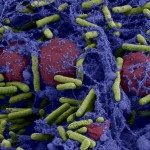Link to Pubmed [PMID] – 38041851
Link to DOI – 10.1093/infdis/jiad528
J Infect Dis 2024 May 15;229(5): 1546-1556
Bone and joint infections (BJIs) are difficult to treat and affect a growing number of patients, in which relapses are observed in 10-20% of the case. These relapses, which call for prolonged antibiotic treatment and increase resistance emergence risk, may originate from ill understood adaptation of the pathogen to the host. Here, we investigated three pairs of Escherichia coli strains from BJI cases and their relapses to unravel in-patient adaptation. Whole genome comparison presented evidence for positive selection and phenotypic characterization showed that biofilm formation remained unchanged, contrary to what is usually described in such cases. Although virulence was not modified, we identified the loss of two virulence factors contributing to immune system evasion in one of the studied strains. Other strategies, including global growth optimization and colicin production, likely allowed the strains to outcompete competitors. This work highlights the variety of strategies allowing in-patient adaptation in BJIs.





